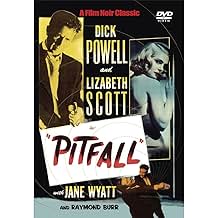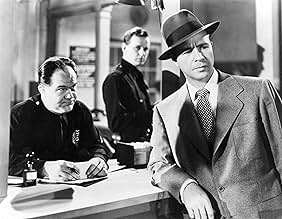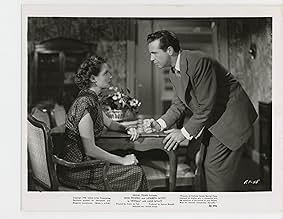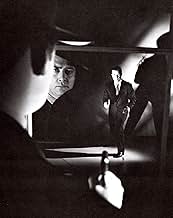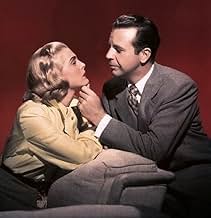CALIFICACIÓN DE IMDb
7.1/10
5 k
TU CALIFICACIÓN
El ajustador de seguros casado John Forbes se enamora de la mujer fatal Mona Stevens mientras su novio está en la cárcel y todos sufren graves consecuencias como resultado.El ajustador de seguros casado John Forbes se enamora de la mujer fatal Mona Stevens mientras su novio está en la cárcel y todos sufren graves consecuencias como resultado.El ajustador de seguros casado John Forbes se enamora de la mujer fatal Mona Stevens mientras su novio está en la cárcel y todos sufren graves consecuencias como resultado.
- Dirección
- Guionistas
- Elenco
- Premios
- 1 premio ganado en total
Dick Wessel
- Desk Sergeant
- (as Dick Wassel)
Eddie Borden
- Prison Visitor
- (sin créditos)
Helen Dickson
- Fashion Show Attendee
- (sin créditos)
Don Haggerty
- District Attorney's Man
- (sin créditos)
Sam Harris
- Man in Diner
- (sin créditos)
Thomas Martin
- Bartender
- (sin créditos)
David McMahon
- Police Lieutenant
- (sin créditos)
Opiniones destacadas
There are a number of ways you can look at this movie, but for me it's a film about a nice girl who can't catch a break with guys. The underrated Lizabeth Scott is effective as a nice girl who's too sexy for her own good; she made me think of the famous Jessica Rabbit line, "I'm not bad, I'm just drawn that way."
Unfortunately, the men in Lizabeth's life are a psycho stalker, beautifully played with understated menace by Raymond Burr, a cheater having a mid-life crisis, and a jailbird. And my impression is every one of them would blame Lizabeth for their own failings.
Taken with the film's other major female character, who has man problems of her own, this movie thinks little of men (unless they are very young or very old), and pretty highly of women.
For me the standout performances were Burr and Scott, but the funny thing about this movie is that, outside of Burr, no one here at IMDb seems to agree much about who's good and who isn't.
While noir films are associated with the detective genre, what makes something noir is its exploration of the darkness within its characters souls and the awful things people are capable of, and this movie takes that on very effectively. It's not a great movie, but it keeps you interested.
Unfortunately, the men in Lizabeth's life are a psycho stalker, beautifully played with understated menace by Raymond Burr, a cheater having a mid-life crisis, and a jailbird. And my impression is every one of them would blame Lizabeth for their own failings.
Taken with the film's other major female character, who has man problems of her own, this movie thinks little of men (unless they are very young or very old), and pretty highly of women.
For me the standout performances were Burr and Scott, but the funny thing about this movie is that, outside of Burr, no one here at IMDb seems to agree much about who's good and who isn't.
While noir films are associated with the detective genre, what makes something noir is its exploration of the darkness within its characters souls and the awful things people are capable of, and this movie takes that on very effectively. It's not a great movie, but it keeps you interested.
It's sad it is now 60 years after this film was released and we still don't have this available on DVD. You even have to pay big bucks to find a used VHS copy. It's "sad" because it is a fine film noir and would make an excellent addition to anyone's noir collection. So many film noirs are now on disc, where is this one??!!
I found you can't go wrong with Dick Powell in a film noir, and Lisabeth Scott certainly ranks among the all-time femme fatales in the genre's history. Add an unlikely pair of actors like Jane Wyatt and Raymond Burr, and Director Andre de Toth and you really have an interesting "old" crime story. "Crime Wave" and "Ramrod," two other fairly unknown-but-excellent hard-bitten noirs were also done by de Toth.
I am always amazed how Powell made such a tremendous career switch from Busby Berkely crooner and romantic to the hard-boiled detective or whatever (a restless insurance agent in here, believe it or not) while Scott seems to have always owned those "loser dame" roles. Between those two and the menacing Burr, who always was that until his Perry Mason TV days, I really enjoying watching this trio.
The film also featured Harry Wild's fine noir photography. Wild was the cinematographer on at least a half dozen film noirs, beginning with "Murder My Sweet" in the beginning of the period, so he knew what he was doing.
I found you can't go wrong with Dick Powell in a film noir, and Lisabeth Scott certainly ranks among the all-time femme fatales in the genre's history. Add an unlikely pair of actors like Jane Wyatt and Raymond Burr, and Director Andre de Toth and you really have an interesting "old" crime story. "Crime Wave" and "Ramrod," two other fairly unknown-but-excellent hard-bitten noirs were also done by de Toth.
I am always amazed how Powell made such a tremendous career switch from Busby Berkely crooner and romantic to the hard-boiled detective or whatever (a restless insurance agent in here, believe it or not) while Scott seems to have always owned those "loser dame" roles. Between those two and the menacing Burr, who always was that until his Perry Mason TV days, I really enjoying watching this trio.
The film also featured Harry Wild's fine noir photography. Wild was the cinematographer on at least a half dozen film noirs, beginning with "Murder My Sweet" in the beginning of the period, so he knew what he was doing.
This is an all-around great noir film, as well as a very chilling anticipation of the sterlingness of the coming 50's ethos of home and fidelity at any price. Dick Powell gives a great performance as a man so tired of life and full of malaise that he can hardly stumble through his days as an insurance adjuster and "loving" father . Raymond Burr is the antithesis of his later Perry Mason (or the good-hearted Paul Drake) as a creepy detective stalking the low-rent Lizabeth Scott. And Jane Wyatt is (unintentionally?) the scariest of them all as Powells' homemaking wife. (After her son has a nightmare, she blames his comic books - and takes them away to be burned!) Pitfall is a fine example of the type of noir film that explores not the criminal underworld but the hidden pain and loneliness of the "everyman".
Andre De Toth's Pitfall opens in the shaky sanctuary of post-war domestic bliss. Jane Wyatt cracks eggs into a cast-iron skillet, to be served to her insurance-claims adjuster husband Dick Powell and their tousle-haired young son; the cozy breakfast nook where they exchange morning what-if banter looks out upon a vista of the New California of subdivisions and revolving credit and sunny possibilities yet to be realized. But, as Wyatt drives Powell into downtown Los Angeles (two-car families still being around the corner), he grouses absently about his routine job and clockwork schedule before giving her a perfunctory peck on the cheek. The canker has invaded the rose. As he later confesses, he feels he's in a rut `six feet deep,' and yearns for freedom adventure. He gets more than he bargained for.
Waiting for him in his office is `Gruesome,' private investigator Raymond Burr, who's done some legwork concerning a convicted felon who has defrauded the company. The felon (Byron Barr) squandered most of his ill-gained money showering his girlfriend (Lizabeth Scott) with furs, an engagement ring and even a little speedboat. Burr, in the course of his sleazy sleuthing, has taken quite an obsessive fancy to her, but Powell warns him off, saying he'll wrap the case up himself.
At first Scott dismisses Powell as just `a little man with a briefcase,' an assessment that tallies too well with his own worst self-image. But to no one's surprise, in this climate of Pacific air and marital dissatisfaction, he ends up taking his own fancy to her, one that turns out to be mutual. They tear around the harbor in her boat, then fritter away the rest of the afternoon in a dim cocktail lounge. He doesn't get back to hearth and home till the wee small hours.
One night when his son is awakened by nightmares, Powell lectures him: `Take only good pictures and have only good dreams.' It's a case of do what I say, not what I do. By veering off from the straight and narrow, Powell has set into motion a chain of baleful events. The vindictive Burr assaults him outside his garage. Scott discovers that Powell's been hiding his life as a married father. Ex-cop Burr starts visiting Barr in stir, sowing seeds of jealousy and plans for revenge. Events converge one dreadful night with an unplanned pair of killings that leave the quick, arguably, worse off than the dead....
Jay Dratler's script (from his own novel) shows a progressive streak in dealing with the short and unpredictable fuses of controlling, potentially violent males stalkers. The script also serves the assembled cast well. True, there's not much to be done with Wyatt, with her cap-sleeved house-dresses and finishing-school elocution, but she's more plausible than she would be two years later as a highly unlikely femme fatale in The Man Who Cheated Himself. Here, she's the distaff side of those male dictators, a wife whose ideals of suburban decorum are chiseled into cold marble (she's a faint forerunner of Joan Crawford's Harriet Craig).
But Powell gets to tap deeply into his key emotion, snappish discontent, and lets it deepen into something close to small-time tragedy. Scott, always an iconic presence but an actress with limits, finds a comfortable part as a bewildered and vulnerable victim of the men who come into her life, bidden and unbidden. Burr, billed fourth (after Wyatt!), possibly fares best. Much in demand in the late 40s as one of the creepiest heavies, he earned that demand by providing extra (and maybe unasked-for) dimensions to the thugs he played. Like the giant Fafner in Das Rheingold, he lets a bit of yearning, of desperation, show under all his intimidating bulk (and in sheer avoirdupois, it's one of his biggest roles).
De Toth, better remembered for his westerns and 3-D horror pix like House of Wax, made, in Pitfall, one of the more distinctive titles of the noir cycle. Not often mentioned in top-ten lists, even those of black-and-white crime films of the post-war era, it has the effrontery to situate deceit and duplicity and betrayal where it surely ought not to belong not in road houses or tenement flats but right at the heart of a storybook American family (it's one of the more subversive films of the era).. Yes, there are lapses, chief among which is a score that keeps trying to crack corny little jokes. But in the denouement far from unleashing a hideous storm of terror, De Toth opts for cold detachment he casts a chill that lingers still.
Waiting for him in his office is `Gruesome,' private investigator Raymond Burr, who's done some legwork concerning a convicted felon who has defrauded the company. The felon (Byron Barr) squandered most of his ill-gained money showering his girlfriend (Lizabeth Scott) with furs, an engagement ring and even a little speedboat. Burr, in the course of his sleazy sleuthing, has taken quite an obsessive fancy to her, but Powell warns him off, saying he'll wrap the case up himself.
At first Scott dismisses Powell as just `a little man with a briefcase,' an assessment that tallies too well with his own worst self-image. But to no one's surprise, in this climate of Pacific air and marital dissatisfaction, he ends up taking his own fancy to her, one that turns out to be mutual. They tear around the harbor in her boat, then fritter away the rest of the afternoon in a dim cocktail lounge. He doesn't get back to hearth and home till the wee small hours.
One night when his son is awakened by nightmares, Powell lectures him: `Take only good pictures and have only good dreams.' It's a case of do what I say, not what I do. By veering off from the straight and narrow, Powell has set into motion a chain of baleful events. The vindictive Burr assaults him outside his garage. Scott discovers that Powell's been hiding his life as a married father. Ex-cop Burr starts visiting Barr in stir, sowing seeds of jealousy and plans for revenge. Events converge one dreadful night with an unplanned pair of killings that leave the quick, arguably, worse off than the dead....
Jay Dratler's script (from his own novel) shows a progressive streak in dealing with the short and unpredictable fuses of controlling, potentially violent males stalkers. The script also serves the assembled cast well. True, there's not much to be done with Wyatt, with her cap-sleeved house-dresses and finishing-school elocution, but she's more plausible than she would be two years later as a highly unlikely femme fatale in The Man Who Cheated Himself. Here, she's the distaff side of those male dictators, a wife whose ideals of suburban decorum are chiseled into cold marble (she's a faint forerunner of Joan Crawford's Harriet Craig).
But Powell gets to tap deeply into his key emotion, snappish discontent, and lets it deepen into something close to small-time tragedy. Scott, always an iconic presence but an actress with limits, finds a comfortable part as a bewildered and vulnerable victim of the men who come into her life, bidden and unbidden. Burr, billed fourth (after Wyatt!), possibly fares best. Much in demand in the late 40s as one of the creepiest heavies, he earned that demand by providing extra (and maybe unasked-for) dimensions to the thugs he played. Like the giant Fafner in Das Rheingold, he lets a bit of yearning, of desperation, show under all his intimidating bulk (and in sheer avoirdupois, it's one of his biggest roles).
De Toth, better remembered for his westerns and 3-D horror pix like House of Wax, made, in Pitfall, one of the more distinctive titles of the noir cycle. Not often mentioned in top-ten lists, even those of black-and-white crime films of the post-war era, it has the effrontery to situate deceit and duplicity and betrayal where it surely ought not to belong not in road houses or tenement flats but right at the heart of a storybook American family (it's one of the more subversive films of the era).. Yes, there are lapses, chief among which is a score that keeps trying to crack corny little jokes. But in the denouement far from unleashing a hideous storm of terror, De Toth opts for cold detachment he casts a chill that lingers still.
Pitfall is about precisely that. Forty something insurance man Dick Powell is getting restless. He's seemingly achieved the American dream, wife, kid, nice home and car. And the nice wife is played by Jane Wyatt who was using this film to warm up for the queen of nice wives in the Fifties as Betty Anderson in Father Knows Best.
Powell is brought a report on a claim that one of the hired investigators Raymond Burr has. Byron Barr has embezzled money that Powell's insurance company is covering. Barr has spent the money lavishly on presents for Lizabeth Scott. Powell has to check this one out for himself. Of course he meets Lizabeth Scott and nature takes its course. Barr mean time is serving time in jail and Raymond Burr has decided to stake out Ms. Scott for himself. Or maybe the right word is stalk.
So we've got Barr serving, Burr stalking, Powell cheating, what's this Lizabeth Scott got to get all these guys hormones working in overdrive?
My description of Pitfall may have been flip up to now, but it really is a fine drama with no real heroes in it, except maybe Jane Wyatt. The best performance in Pitfall goes to Raymond Burr who is really a malevolent figure with his obsession about Scott.
Powell is brought a report on a claim that one of the hired investigators Raymond Burr has. Byron Barr has embezzled money that Powell's insurance company is covering. Barr has spent the money lavishly on presents for Lizabeth Scott. Powell has to check this one out for himself. Of course he meets Lizabeth Scott and nature takes its course. Barr mean time is serving time in jail and Raymond Burr has decided to stake out Ms. Scott for himself. Or maybe the right word is stalk.
So we've got Barr serving, Burr stalking, Powell cheating, what's this Lizabeth Scott got to get all these guys hormones working in overdrive?
My description of Pitfall may have been flip up to now, but it really is a fine drama with no real heroes in it, except maybe Jane Wyatt. The best performance in Pitfall goes to Raymond Burr who is really a malevolent figure with his obsession about Scott.
¿Sabías que…?
- TriviaThis was independently produced by Regal Films and released through United Artists. For decades, the film was rarely seen. It can be seen today through the preservation efforts of the UCLA Film and Television Archives.
- ErroresThe public elevator indicator in the Los Angeles Hall of Justice building shows floors 1 to 19. However, in reality, the building is only 14 stories tall.
- Citas
Tommy Forbes: Dad was a boxer in college!
Doctor: I think he was wise to go into insurance.
Doctor: [handing a prescription to Sue Forbes] Take this up to the drug store.
Sue Forbes: What is it?
Doctor: A course in boxing.
- ConexionesFeatured in Noir Alley: Pitfall (2018)
Selecciones populares
Inicia sesión para calificar y agrega a la lista de videos para obtener recomendaciones personalizadas
Detalles
Taquilla
- Presupuesto
- USD 1,000,000 (estimado)
- Tiempo de ejecución1 hora 26 minutos
- Color
- Relación de aspecto
- 1.37 : 1
Contribuir a esta página
Sugiere una edición o agrega el contenido que falta

Principales brechas de datos
By what name was La senda tentadora (1948) officially released in India in English?
Responda


